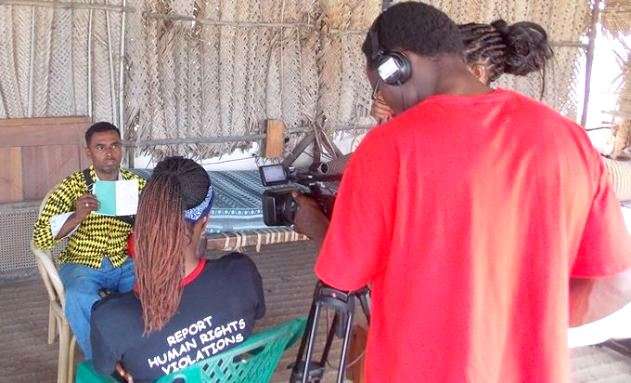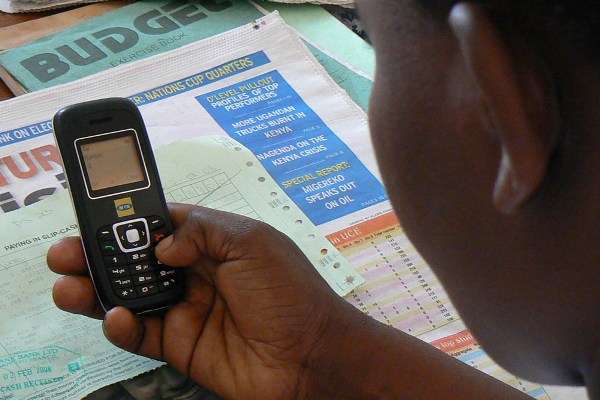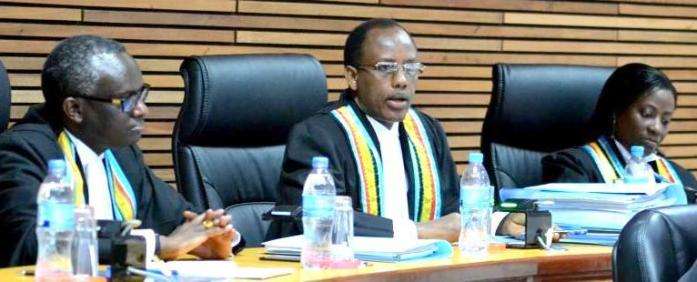By Catherine Kamatu |
Joseph Kitaka, a resident of Yatta in Machakos County, Kenya, has always had an interest in defending human rights. His community is faced with numerous challenges, including gender-based violence, police brutality and many other human rights violations. Mr. Kitaka had little hope of utilising Information and Communication Technology (ICT) to advance his ambition in bettering his community, until he was elected the chairman of Yatta Paralegal Network, a local Human Rights Network (HURINET).
Today, Yatta, is among 15 HURINETs in Kenya that are being supported by the Kenya Human Rights Commission (KHRC) to strengthen democratisation by widening civil society use of ICT to advance political accountability, freedom of expression and respect for human rights. The initiative is part of the ICT4Democracy in East Africa Network, a regional coalition of civil society organisations coordinated by the Collaboration on International ICT Policy for East and Southern Africa (CIPESA).
The network maintains various ICT platforms and undertakes activities including research, capacity building, mentoring, advocacy and civic engagement toward strengthening democracy. The network’s partners use digital technologies to hold leaders accountable to citizens, fight corruption, enhance communication and the right to freedom of expression, as well as the right to seek, receive and impart information and respect for human rights.
In Kenya, KHRC maintains an SMS short code and crowd mapping platform which enable citizen reporting of human rights violations, and building a vibrant social movement of citizens who monitor government performance toward a society free of human rights violations.
Through KHRC’s project, 10 HURINETs have received computers, modems, generators and digital cameras to support their work. Mr. Kitaka received a modem, a computer and a digital camera to enable the smooth operations of his network. He asserts that the equipment greatly eased information sharing among the networks and other human rights defenders.
“Three years ago, sharing information was a challenge. It took very long for human rights defenders to share reports, it was also very expensive since we could only access ICT equipment in cyber cafes at a cost. With the equipment given to us by KHRC, everything is moving on well,” he said.

Earlier in 2014, KHRC conducted two community outreaches in the Kibera and Kangemi informal settlements in the capital of Kenya where active audiences of 109 and 138 respectively were trained in the use of ICT platforms for promoting human rights and good governance. These engagements enabled hundreds of ordinary citizens to use web tools (such as SMS, Facebook, HakiReport, HakiZetu) to report on governance processes.
Kenya has high rates of access to digital technology, with mobile access rates at 80% and internet access rates at 57%. However, most citizens do not have the skills to use simple technology tools in pursuance of good governance at a time the Kenyan government is making laws and regulations that limit freedom of expression.
In a bid to enhance the quality of the content generated by the human rights networks, KHRC further trained human rights defenders on communications skills in February 2015. The training focused on news writing, multimedia use, interview skills, social media and use of the KHRC e-library as a research tool.
The training was attended by 15 local human rights workers, who will collectively contribute to the newsletter Mizizi ya Haki (The Roots of Justice), which focuses on activities of human rights networks. “From the skills obtained from the communications training facilitated by KHRC, I have managed to train other human rights defenders on how to file good reports,” added Mr. Kitaka.
The training evaluation indicated an overall change in the knowledge, skills and attitudes of all beneficiaries. Social media and article writing were indicated as the most useful training sessions toward the beneficiaries’ more effective human rights work.
However, further training needs were also identified, including digital security, media laws and multi-media content generation. Participants also identified a need for training in proposal writing and resources mobilisation as well as in paralegal work.
Read the full evaluation report here http://bit.ly/1Pu1w6h
The work of KHRC and the ICT4Democracy Network is supported by Swedish International Development Cooperation Agency (Sida).
Update on the State of Internet Freedom in Burundi
By Jean Paul Nkurunziza and Alain Ndikumana |
Following on from the State of Internet Freedoms in Burundi 2014 report published last May, this brief presents an update on Information and Communication Technology (ICT) access, the legal and regulatory policies and practices that affect internet freedoms in the Burundi. It covers the period from March 2014 to May 2015. Notably, Burundi has been rocked by a coup attempt and intermittent public protests against President Pierre Nkurunziza’s plan to contest for a third term in office in apparent defiance of a two terms limit set by the constitution.
During the upheavals in April and May, the country’s communications regulator reportedly directed internet service providers to cut access to social media, and several media houses were pillaged. Meanwhile, the East African Court of Justice declared sections of the country’s media law undemocratic, but it upheld articles on the regulation of print and online media, which have been criticised by journalists and human rights defenders for negating freedom of expression.
Read the full State of Internet Freedoms in Burundi as of June 2015
OpenNet Africa Challenge Uncovers Gaps in Digital Safety Tools
By Ashnah Kalemera |
There are numerous tools which can secure online users’ communications, including through anonymising their identities and enabling them to circumvent online surveillance and censorship. In some cases, developers have gone on to localise such tools to suit various contexts. However, the tools’ relevance to certain populations and how best to improve them for a diverse range of users remains largely unknown.
During May 2015, the Collaboration on International ICT Policy for East and Southern Africa (CIPESA) in partnership with tech innovation hub OutBox challenged members of the Ugandan tech community to test five digital safety and security tools in order to gain an understanding, in a local context, of the tools’ strengths, weaknesses and opportunities for localisation. The challenge was in the context of CIPESA’s OpenNet Africa initiative which monitors and promotes internet freedom in east and southern Africa.
The tested tools were Cyrptocat, Mailvelope, Martus, TextSecure and Redphone. The scope of testing included how the tools enabled anonymisation, circumvention, and privacy of communications. The tests had to take into consideration different user communities, including women, bloggers, journalists, human rights defenders, and sexual minorities, and the nature of threats to internet freedom in the East African region.

These threats are often linked to the fight against terrorism, combating online hate speech, suppressing the views of opposition parties (mainly around election periods), and in crackdowns against particular groups, such as Lesbian, Gay, Bisexual, and Transgender (LGBT) community, critical media and human rights activists. The threats often come in the form of surveillance, blocking of websites and social media sites, and interception of communications.
Three teams participated in the challenge through trial exercises, user consultations and stakeholder interviews. In considering which tools were better suited to promote internet freedoms of the region’s citizens, the teams that conducted the tests also bore in mind the proliferation of technology, internet speeds and literacy levels in the region. Language, multiple device use and aesthetics such as the interface design including colours and icons, were also among the other features for testing.
The teams found a number of shortcomings on some tools, including the lack of protection from key loggers, poor or no consideration for low internet speed users and those with low ICT skills and literacy levels. Some tools were found to have limited cross platform/device operability, while others were not accessible to visually impaired persons.
Select test findings
| Tool | Safety and Security Features | Key test finding limitation |
| Martus | Allows for secure collection, transmission and storage of data. It is popularly used by human rights defenders. |
|
| Cryptocat | This app enables encrypted chat via a browser and mobile phone. |
|
| Mailvelope | This is a browser extension that enables the exchange of encrypted emails |
|
| Redphone | An Android based mobile app that allows for encrypted voice calls over a Wi-Fi or data connection using a normal phone number. |
|
| TextSecure | Secure messaging app |
|
“Pious, a 25-year old IT student at Makerere said that he is now using Redphone with his girlfriend whenever they feel like phone sex in order to avoid the spying software announced by Fr. Simon Lukodo, Minister of Ethics and Integrity,” Tean Tech4Dev
The teams made recommendations for improvement and localisation, including translation of the tools into local languages, compatibility provisions across social media platforms, and feature phone support.
The teams also proposed numerous cases in which the tools can be used by marginalised and vulnerable user groups in East Africa. They cited youth mobilisation, gender-based violence and other human rights violations reporting, monitoring and victims support, facilitation of opposition groups’ activities, and protection from corporate espionage.
However, the teams also highlighted the potential of the tools promoting hate speech and radicalism in East Africa’s fragile socio-political environment through safeguarding the communications and activities of offenders.
“One of the primary uses of the Internet by terrorists is for the dissemination of propaganda. Through encrypted communications, terrorists can easily spread their propaganda and also plan their activities,” noted Team African Value. The team added that promotion of divisiveness and encouraging violent acts on ethnic grounds has become common on East African online platforms.
The teams also noted the need for increased awareness raising and capacity building among users to promote an understanding of cyber threats and online safety. Among the possible ways to achieve this was through working with academia to develop cyber security curriculums for education institutions.
The findings of the teams were showcased at a pitching event held on June 2, 2015 where a panel of judges determined the team with the best reports and localisation recommendations. The judges were Wilson Abigaba (Internet Society – Uganda Chapter), Richard Lusimbo (Sexual Minorities Uganda), Baldwin Okello (Uganda Telecom) and Neil Blazevic and Mark Kiggundu – both from East and Horn of Africa Human Rights Defenders Project.
The winning team was Tech4Dev, which was followed by Ghost In The Wires then African Values. See more on the event on Storify
Promoting inclusive use of ICT in monitoring service delivery in Uganda
By Lillian Nalwoga |
For true democracy to flourish there is need for government transparency, greater access to public information, and inclusion of citizens’ voices in decision-making processes. The use of Information and Communication Technologies (ICT) can aid in increasing awareness and empowering citizens to meaningfully participate in governance processes such as monitoring public services delivery.
The Collaboration on International ICT Policy in East and Southern Africa (CIPESA) has since 2011 implemented the iParticipate Uganda project, which leverages ICT to catalyse civic participation and democracy monitoring in Uganda. While working with grassroots based partners, CIPESA has offered capacity building sessions, and created awareness on how Ugandan citizens can effectively use different ICT tools for social accountability, including monitoring and demanding quality public services.
In 2014, CIPESA worked with the Northern Uganda Media Club (NUMEC) to document service delivery failures as a result of donor aid cuts to the Peace, Recovery and Development Plan (PRDP). The PRDP was launched in 2007 by the government of Uganda in partnership with development partners to revitalise the economy and promote peace-building and reconciliation in post-conflict northern Uganda. However, implementation has faced challenges of corruption and a lack of transparency in its methods of work.

The CIPESA-NUMEC work thus involved promoting dialogue between community members and duty bearers through community debates, radio talk shows and social media on how to improve service delivery for people living in post-conflict communities. Through these engagements, leaders have recognised the need to promote awareness of government programmes among the local communities for better monitoringof service delivery.
For instance, in one of the community debates organised by NUMEC, David Latigo Odongo, the Local Council Chairman of Acet village, Gulu district, acknowledged that lack of sensitisation hampers beneficiaries from monitoring government implemented projects. “They [citizens] do not know who will monitor and take care of PRDP projects, that is why when projects like water boreholes are constructed in the area, people look at it as freebies from either the government or NGOs,” he said.
Further, following the production of a documentary on poor service delivery, Martin Mapenduzi, the Gulu district Chairperson, was prompted to make follow-up on some stalled projects.

Similarly, in western Uganda where CIPESA is working with the eSociety Resource Centre located in Kasese district, another leader acknowledgenes to reach them. eources to health centers were located in semi-urban areas and the journalists lacked enough reseources toed the importance of promoting access to information as a means of enhancing citizens’ monitoring of public service delivery. “Meaningful participation in democratic processes requires informed participants hence the need for increased access to information,” observed John Thawite, the District Information Officer during the e-governance training for local leaders in the district.
This training was aimed at giving district officials skills to update the district website, elibrary and participate in the online district discussion group and Facebook discussions. As a result of this training, and the provision of free ICT services, the district online platforms have been more active and are updated regularly.
The centre serves as a community facility hosted by the Kasese district local government. CIPESA has supported it through the provision of computer equipment, internet subscription and facilitation for the ICT training officer.

At the Busoga Open Source Development Initiative (BROSDI) centre in Mayuge district in eastern Uganda, local communities are being supported by CIPESA in using ICT to monitor education service delivery. This has included training in the use of ICT for civic engagement, access to information and service delivery monitoring. Beneficiaries from one of the training sessions went on to create a project blog to enable users report on different service delivery issues in the district.
In 2014, more than 200 community members benefited from the trainings conducted at our partner centres.
CIPESA also conducted participatory research to document citizens’ knowledge, perceptions and attitudes towards use of ICT tools in monitoring service delivery. Participants in the research acknowledged the need to empower leaders in the use of ICT to respond to citizens’ demands. “Social media will be great when a new breed of users, that is people in leadership, start using it for civic engagement and governance monitoring,” observed a participant in a focus group discussion on citizens’ motivations for using ICT in governance processes.
These grassroots-based engagements, as well as the findings of research exercises on citizens’ and leaders’ use of ICT, access to information and service delivery monitoring will further inform CIPESA’s efforts to close the gap in the awareness and use of technology for enabling democratic processes.
East African Court Declares Sections of Burundi’s Media Law ‘Undemocratic’
By Wairagala Wakabi |
The East African Court of Justice (EACJ) has ruled that sections of Burundi’s Press Law of 2013 violate democratic principles and should be repealed. However, the court upheld several other clauses, including those related to regulation of print and online media.
Delivered on May 15 at the Arusha, Tanzania-based court, the ruling found two articles (19 & and 20) in contravention of the principles on democracy and accountability in the constitution of the East African Community (EAC), the regional inter-governmental organisation that groups Burundi, Kenya, Rwanda, Tanzania, and Uganda.
Judges said restrictions in Article 19, prohibited the “dissemination of information on the stability of the currency, offensive articles or reports regarding public or private persons, information that may harm the credit of the state and national economy, diplomacy, scientific research and reports of Commissions of Inquiry by the state” and could not stand the test of reasonability, rationality or proportionality.
On Article 20, which requires journalists to disclose confidential sources of information, the judges ruled that other laws could be enacted to deal with state secrets rather than forcing journalists to disclose their confidential sources.
The ruling comes nearly two years after the Burundi Journalists Union (BJU) lodged a petition before the regional court asking judges to order an immediate repeal of 42 articles in the law, which they said were inimical to democracy and freedom of expression.
In the July 2013 petition, the journalists’ union contested Article 29 that makes it a requirement for online publications and news agencies to disclose certain information to the National Communication Council (CNC) or the public prosecutor’s office. This information includes the first edition of the publication, the name, nationality and full address and criminal record of the Director of the publication, the full address of the web host, the languages of publication and the constitution of the web publisher.
However, in their ruling, the judges did not refer to this article and to others which the petitioners said provided “an unduly onerous and restrictive framework for the regulation of the print and web media.”
Other articles which the journalists wanted invalidated relate to the requirement of compulsory accreditation for all journalists, prior censorship regime for films to be directed in Burundi, the right of reply and correction “that is vaguely worded and unduly impedes the media’s right to freedom of expression”, and the “hefty” fines and penalties specified by the law.
The judges stated that under the articles of the EAC Treaty, “the principles of democracy must of necessity include adherence to press freedom.” They noted that a free press goes hand in hand with the principles of accountability and transparency, two fundamental principles reiterated in the Treaty which partner states have to adhere to.
Moreover, the judges noted that while the EACJ could not superintend the organs of partner states in the ways they enact their laws, “it is an obligation on their part not to enact or sustain laws that completely negate the purpose for which the Treaty was itself enacted.”
The judges further stated that they would direct the Republic of Burundi, “within its internal legal processes, to implement the EACJ judgment.”
In pleadings before the court, the Burundi government argued that since it was preparing for elections in 2015, invalidating the law would jeorpadise its delicate stability.
Burundi is reeling under the effects of political unrest that has seen media freedom take a big hit. President Pierre Nkurunziza’s resolve to contest for a third term in office in defiance of a two terms limit set by the constitution sparked mass protests in the country, during which government banned live reporting from the scenes of the demonstrations.
Broadcasts from three popular radio stations – Radio Isanganiro, Radio Publique Africaine (RPA), and Radio Bonesha – were also suspended beyond the capital Bujumbura.
Last week, amidst a coup attempt, the privately owned RPA was hit by a rocket and reportedly set ablaze by police and pro- ruling party youth. Rema radio and television, said to be allied to the ruling party, was torched by protesters. State-owned radio and TV were forced on and off air and their headquarters was the scene of fierce fighting, as forces jostled for the control of Bujumbura and the channels of mass communication.
There were reports that Whatsapp, twitter and Facebook were cut off to limit their use by protest organisers following orders in writing by the country’s telecommunications regulator, L’Agence de Régulation et de Contrôle des Télécommunications (ARCT), to block certain sites.
Read more about the policies and practices defining the country’s internet freedom in The State of Internet Freedoms in Burundi 2014 report.
Image Credit: East African Court of Justice, Arusha





